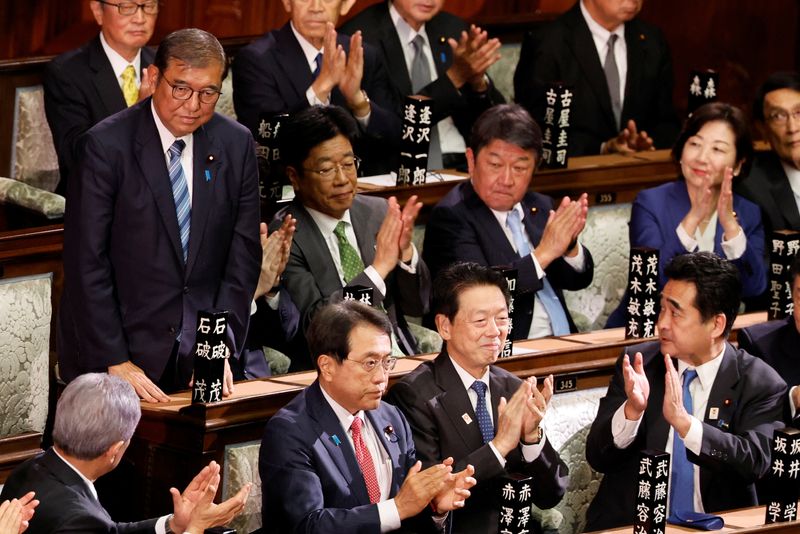By John Geddie and Tim Kelly
TOKYO (Reuters) -Japanese lawmakers voted for Prime Minister Shigeru Ishiba to remain on as chief on Monday (NASDAQ:), after his scandal-tarnished coalition misplaced its parliamentary majority in a decrease home election final month.
Ishiba, who referred to as the snap ballot after taking workplace on Oct. 1, should now run a fragile minority authorities as protectionist Donald Trump regains management in predominant ally the US, pressure rises with rivals China and North Korea, and home stress mounts to rein in the price of residing.
His Liberal Democratic Social gathering and coalition associate Komeito received the most important bloc of seats within the election however misplaced the bulk held since 2012, leaving him beholden to small opposition events to move his coverage agenda.
Underlining that fragility, Monday’s vote in parliament, broadcast on tv, went to a runoff for the primary time in 30 years, with no candidate capable of muster majority help within the first spherical.
However Ishiba finally prevailed as anticipated, garnering 221 votes within the 465-seat decrease home, properly away from his nearest challenger, ex-PM Yoshihiko Noda, the pinnacle of the principle opposition Constitutional Democratic Social gathering.
Japan will maintain elections subsequent yr for the much less highly effective higher home, the place the ruling coalition’s slim majority may be in danger if Ishiba can not revive public belief in his administration, which has been roiled by a scandal over unrecorded donations to lawmakers.
His imminent problem is compiling a supplementary price range for the fiscal yr by means of March, below stress from voters and opposition events to lift spending on welfare and take steps to offset rising costs.
Ishiba additionally has a slate of worldwide engagements, akin to a summit of the Group of 20 massive economies in Brazil on Nov. 18 and 19. He’s attempting to rearrange a stopover in the US across the G20 summit to satisfy Trump.

Some Japanese officers worry Trump may once more hit Tokyo with protectionist commerce measures and revive calls for for it to pay extra for the price of stationing U.S. forces there.
These points have been largely smoothed over in Trump’s first time period, from 2017 to 2021, by the shut ties between the president and Japan’s then-premier, Shinzo Abe – a bond Ishiba appears eager to re-establish.




